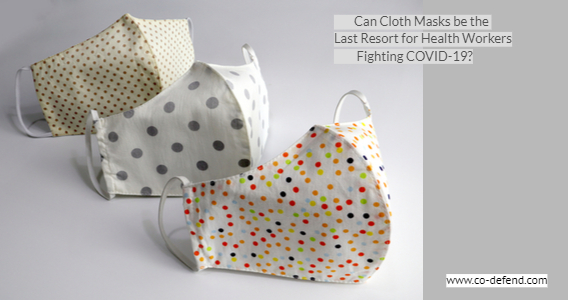Even as vaccines show promise, coronavirus cases continue to surge across the U.S. The country set two single-day records on Wednesday, December 16: more than 3,600 deaths and more than 245,000 new infections, The New York Times reported. Federal agencies are working at an overwhelming pace to ensure a rapid rollout of mass vaccination campaigns. However, experts believe that we’re still months away from the point where most of the population will get a shot. That means COVID safety measures must continue for some time.
By now, most of us know the drill: mask-wearing, handwashing, and social distancing. But for health workers, the story is different. With astronomically rising numbers of hospitalizations, front-like workers are more vulnerable than ever. That means, as a medical professional, you must strictly adhere to personal protection best practices. And face masks are on the top of those measures. But even though PPE equipment manufactures scaled production, medical-grade products are still short in supply. And that’s where the question about cloth face masks comes into play.
Dealing with the Medical Supply Shortage
Despite repeated efforts by medical equipment manufacturers and wholesale mask suppliers, N95s and other PPE are not sufficiently available. To deal with this persisting shortage, some health workers are now using cloth face masks, which are usually more easily available. The Centers for Disease Prevention and Control (CDC) recommends using home-made cloth face masks as a last resort. But the use of cloth face masks by health workers is a concerning trend for respiratory disease researchers. In a randomized clinical trial, researchers found that cloth mask users are at higher risk of infection.
The clinical trial concluded that the infection rate was highest with the cloth face mask group, compared with medical-grade mask wearers. The penetration rate of respiratory droplets was 97% for cloth face masks compared to medical face masks. So, what exactly are the elements that create the desired protection for the mask wearer? Let’s find out.
What Makes a Mask Protective?
New research has shown that a few simple upgrades in fabric, filters, and fit significantly enhance the protective abilities of a mask. Cloth masks made of cotton, silk, or woven fabric have been used since the early 20th century to protect health workers.
Dr. Larry Marr, a professor of civil and environmental engineering at Virginia Tech and one of the world’s leading aerosol scientists, led research on 11 different mask materials. The findings are significant for mask wearers and PPE equipment manufacturers alike.
Three layers offer better safety
According to Dr. Marr and her colleagues’ research, the best has two tightly woven layers of outer material separated by a filter material in the middle. Mask makers could use surgical mask material or even a piece of vacuum bag as a filter sandwiched between the outer layers. Dr. Marr says even coffee filters are an option. But they could make masks less breathable.
As a wearer, if you like a two-layer mask, you can wear it over a surgical mask when you need optimal protection. A three-layer fabric mask worn properly can stop 74 to 90% of harmful particles, the study found.
Flexible material is better than stiff
When manufacturers use stiff material for making a mask, it creates gaps. Always look for masks that are made of tightly woven flexible material. Such masks easily curve onto your face. Masks made with wire can be molded around the nose to fit better onto the wearer’s face.
Ties around the head are better than ear loops
Face masks that tie around your head fit better than the ones with ear loops. Usually, they are also more comfortable. Ear loops leave bigger around your face, thereby reducing the level of protection. Besides, if you wear a mask for a longer period, the loops cause your ears to become sore. When searching PPE sellers or wholesale mask suppliers, look for masks with ties.
Well-fitted masks protect the wearer
The study by Dr. Marr and her colleagues also tested cloth masks for how well they protected the wearer and the others. They called it inward and outward protection. Usually, face masks are most efficient at filtering outgoing particles. However, they do stop incoming particles as well at nearly the same efficiency. The only condition here is that the mast must be tight-fitting to the wearer’s face. Masks that could not rightly protect the wearer were the ones made of a stiffer material and those worn loosely.
Face shields worn with a mask offer protection
Several studies have now concluded that face shields alone offer little to no protection against risky particles. Clear plastic shields are impermeable. However, air seeps out and comes in around the edges of the shield. But a face shield worn with a mask offers superior protection, especially for the eyes of the wearer.
Conclusion
These research findings, combined with other information, should reassure you about the benefits of cloth masks. Masks cannot guarantee 100% protection, and it’s crucial to combine mask-wearing with other COVID safety measures mentioned early in this post. As you must be aware, health workers have already started to get vaccinated. The next in the line are other vulnerable Americans living in long-term care nursing homes.
If you are not an elderly or health worker, it would still be months before you get a shot of Pfizer, Moderna, or any other vaccine. Until then, personal protective equipment and safety measures are our only protection. At Co-Defend, one of the most trusted bulk PPE suppliers in the USA, we are committed to helping the country until we win this battle entirely. We offer an extensive range of PPE products, including masks, gloves, hand sanitizers, and medical protective clothing.
